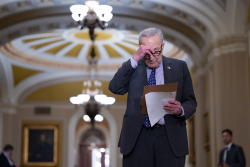ARTICLE AD BOX
In the secretive cloisters of the Vatican, where bishops and cardinals plot and scheme, Martin Selmayr was seen as a natural (for a Protestant, at least).
But the man who once ran the European Commission with an iron grip devoted his best work to charting his course back to the Berlaymont.
However, his latest scheme for ending his effective exile in Rome, where he is EU ambassador to the Holy See, and returning to Brussels seems to have come apart.
The job that looked set to be his — deputy secretary-general of the European External Action Service (EEAS), a new role strong-arming EU leaders into agreeing on foreign policy — seemed ideal. But it was clumsy politicking that proved to be the downfall of the veteran German civil servant.
According to three officials, granted anonymity to talk about the backroom dealings, `Selmayr looks set to stay in Rome for the foreseeable future after opposition from the top of the European Commission sank his bid, particularly because he has so far declined to take an alternative role in the Belgian capital.
The scheming came to a head at a meeting of the College of Commissioners on Oct. 21, when a conclave of Ursula von der Leyen allies proposed that Selmayr be given the role of special envoy for religious freedoms, a job that would have brought him back to Brussels but in a much less high-profile role than the one at the EEAS.
The plan was drawn up because of Selmayr’s very public maneuvering, which spooked some national capitals, according to those in the room.
“This was a way to say OK, if he wants to come back to Brussels, here’s how you do it,” said one of the EU officials of the offer for the religious freedom envoy role.
However, at a College of Commissioners meeting earlier this week, Selmayr was not put forward for the role of religious freedom envoy either. “This was the only job open to him,” said the official. “If he doesn’t want that, he stays in Rome.”
Selmayr has declined to comment publicly throughout the process.
Dominus vobiscum
During his time as chief of staff to former Commission President Jean-Claude Juncker, Selmayr gained a reputation for ruthless efficiency. He was also branded the “Monster of the Berlaymont” for his hard-nosed tactics.
Many imagined Selmayr’s 2019 departure, designed to allay fears about German over-representation and give new President von der Leyen a clean slate to govern, would be the end of his time in Brussels.
However, Selmayr’s irrepressible energy and intelligence made him stand out even from Rome, where he made a splash entertaining dignitaries, cardinals and other Vatican potentates from his lavish HQ abutting the ancient Baths of Caracalla.
 During his time as chief of staff to former Commission President Jean-Claude Juncker, Selmayr gained a reputation for ruthless efficiency. | Pool photo by Ludovic Marin/EPA
During his time as chief of staff to former Commission President Jean-Claude Juncker, Selmayr gained a reputation for ruthless efficiency. | Pool photo by Ludovic Marin/EPA“That someone who’s been a political animal in Brussels can fit in here and earn respect in the Vatican, that speaks to his qualities,” said one emmissary who got to know Selmayr well and was granted anonymity to speak freely. “I’ve seen him leading the room at EU ambassadors’ meetings; he was charming, suave, and very well-informed.”
Also tasked with representing the EU in talks with the UN’s Food and Agriculture Organization, diplomats said Selmayr provided an immediate boost to the bloc’s standing, turning his Brussels-honed skills to the issues at hand.
Clerics and seasoned attachés alike were awed by how much this establishment creature knew about their cloistered Catholic world, with one pointing out that he appeared to enjoy the Vatican brief more than he was supposed to — given he was officially supposed to prioritize the UN part of the job.
A diplomatic insider, meanwhile, said Selmayr seemed overqualified for the ambassadorship. “He is quite up for scheming, which is fun, but scheming about multilateral agriculture issues is hardly high geopolitics. You can tell he wants to be more forceful and make stuff happen quickly, but gets that isn’t how it works here … he does the job, it just isn’t a very taxing job.”
Sede vacante
The sight of one of the EU’s most accomplished backroom operators languishing in the Vatican presented a clear opportunity for the EU’s top diplomat, Kaja Kallas, and her allies. For months, the former Estonian prime minister has been locked in a power struggle with national capitals over flagship policies such as sanctioning Israel and relations with U.S. President Donald Trump.
 Many imagined Selmayr’s 2019 departure, designed to give new President von der Leyen a clean slate to govern, would be the end of his time in Brussels. | Ronald Wittek/EPA
Many imagined Selmayr’s 2019 departure, designed to give new President von der Leyen a clean slate to govern, would be the end of his time in Brussels. | Ronald Wittek/EPAKallas has also been in an increasingly bitter standoff with von der Leyen and her own all-powerful German head of cabinet, Selmayr’s successor, Björn Seibert.
“Kaja wants her own Björn,” said a third diplomat, “and that’s Martin.”
But there were concerns that unleashing Selmayr’s scheming in Brussels could worsen the already tense political landscape. “The only similarities between Björn and Martin are that they’re both very smart and they’re both from Germany,” said the senior EU official, arguing that Seibert strives for loyalty and quiet competence while Selmayr is a political animal with few such scruples.
“People think he’d be a kind of monster under the bed for von der Leyen — really, he’d be the monster under the bed for Kallas.”
Cardinales electores
A Selmayr return to the EEAS would have been controversial because of his reputation, but the pieces were never really in place, according to Günther Oettinger, who served as Germany’s European commissioner from 2010 until 2019, including the period when Selmayr was at the peak of his powers as secretary-general of the European Commission.
“The preparatory work was not convincing,” Oettinger said. “For such a senior post in the EEAS, you need the full backing of several member states: because he’s German, the full backing of the German government, in addition to France, Poland and so on.”
 A Selmayr return to the EEAS would have been controversial because of his reputation, but the pieces were never really in place, according to Günther Oettinger. | Stephanie Lecocq/EPA
A Selmayr return to the EEAS would have been controversial because of his reputation, but the pieces were never really in place, according to Günther Oettinger. | Stephanie Lecocq/EPA“To have the idea is the first step, but to not procure the full backing of member states — I’d say this was a mistake of Madam Kallas,” said Oettinger.
Diplomats and officials who spoke to POLITICO said key countries were not asked about a Selmayr return or kept informed on the process. There was also division in Germany over a potential reappearance of Selmayr.
Germany’s EU Affairs Minister Gunther Krichbaum told POLITICO in late October that he would “very much welcome” Selmayr returning to the fray in a senior role, sparking an immediate rebuke from his own government.
Habemus plan-am
The high-handed scheming on Selmayr’s future has now alienated even the faith community that he had worked hard to build bridges with.
“It’s a bit upsetting that this position [special envoy for religious freedoms] is being politicized, it’s not what Church has asked for,” said Manuel Barrios, who lobbies on behalf of Europe’s bishops’ conferences in Brussels. “We’ve been back and forth some times — a lot of parties have asked for this already, so it’s a bit upsetting that this is being used as a political fight. It seems von der Leyen is not very interested — neither her nor her head of cabinet.”
 Kaja Kallas has also been in an increasingly bitter standoff with von der Leyen and her own all-powerful German head of cabinet, Selmayr’s successor, Björn Seibert. | Olivier Hoslet/EPA
Kaja Kallas has also been in an increasingly bitter standoff with von der Leyen and her own all-powerful German head of cabinet, Selmayr’s successor, Björn Seibert. | Olivier Hoslet/EPAThe Commission is also under fire from civil society groups over fears that jobs are being stitched up behind closed doors by its gray cardinals. In a letter to von der Leyen, Humanists International warned that the role of the envoy is too important to play politics with. Officials, they say, should put forward “a transparent and accountable selection process, which should, at a minimum, include public lists of candidates and criteria as well as the meaningful consultation of Parliament and civil society.”
For now, the German apparatchik is pushing on with his plans undeterred.
“Mr. Selmayr successfully completed the application process at the EEAS last week,” said a person with knowledge of his application.
“Whether he will be able to take up this position in the near future or will continue to serve as EU Ambassador to the United Nations in Rome and to the Holy See must now be decided jointly by the EU High Representative and the President of the Commission ‘in the interest of the service.'”
But, as Selmayr’s best-laid plans come up against those of the EU’s leadership, all he and his allies can do is double down on their plotting and hope they can do it better than his rivals.
“He’s eminently qualified,” said a fourth diplomat. “If he doesn’t get the job, it’s down to politics.”
Gabriel Gavin reported from Paris. Ben Munster reported from Brussels. Hannah Roberts reported from Rome. Hans von der Burchard reported from Berlin.
.png)
 9 hours ago
2
9 hours ago
2








 English (US)
English (US)